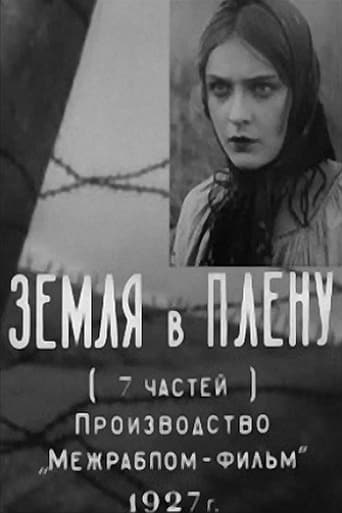

In 1928, this was one of the first Soviet films to reach the west and considered on a par with Potemkin; Variety felt it was so important that they reviewed it twice (once from the artistic perspective and once from the average exhibitor's jaundiced viewpoint). If not the stylistic groundbreaker that Potemkin was, it's an impressive work of both visual beauty and emotional impact (rare among Soviet silents), that warrants rediscovery for itself and for its director, whose first solo effort (after co-directing Miss Mend with Boris Barnet) this was.Maria (Anna Sten) and Jacob (I.I. Koval Samborski) are a happy peasant couple soon to become unhappy; the local baron, who rented them the rockiest piece of land this side of Man of Aran, has a daughter, who forces Sten to abandon her own family and wetnurse hers. She in turn has a husband (Vladimir Fogel of Miss Mend) who lusts after the peasant girl whose bare shoulder he's exposed to on a regular basis, and all this leads to Maria having a fight with her husband, trying to flee the home, and winding up with the infamous Yellow Ticket certifying her as a member of the profession of prostitute. (Note: this film bears no resemblance to any other film of that title, most of which are based on a famous American play of the teens.)Clearly Ozep, in devising this Zolaesque story, was looking for material that would fly with the regime, and there's a perfectly good expose of the decadence of the Tsarist regime here, chaining peasants to aristocratic whim just as the land is chained with barbed wire, and using their bodies for feeding or pleasure indiscriminately. If Ozep's visual lyricism about peasants and the land doesn't go to the florid extremes of, say, Dovzhenko, on the other hand it has a sharp point which it makes with precision and a mordant wit, which you can't really say of Earth. In fact, though the scenes of Maria and Jacob's peasant life have a rough-edged believability (as in his next film, The Living Corpse, Ozep is a great caster of weatherbeaten, non-actor extras) and quite a lot of visual beauty, the strongest section of the film is when Maria sinks into the profession for which she mistakenly has the ticket. It's worth noting that Ozep made three films in a row with substantial brothel sequences (The Living Corpse and The Murderer Dmitri Karamasoff), and in each case he seems to evince a real, ahem, love for the milieu in all its forced joviality, wanton desire, and seedy decadence, music and lust and self-loathing combining for a vivid impression of manic-depressive hell on earth. Sten, too, reaches the high point of her performance here, trading Maria's customary cow-like blank stare for a despondent world-weariness.
... View MoreThe Hollywood producer Sam Goldwyn had a Greta Garbo complex: for well over a decade, he made repeated attempts to find some exotic European actress whom he could lure to Hollywood and mould into the next Garbo. He brought several would-be Garbos to Hollywood, but none of them ever clicked. The least unsuccessful of these was Anna Sten, who was pretty and somewhat talented but definitely no Garbo. Several years after Sten's career failed to take off, Goldwyn was still importing new Garbo wanna-be's ... with the result that one of them became known as "Goldwyn's Last Sten".'Zemlya v plenu' is intended as a starring vehicle for Anna Stein; she is pretty and personable here, but hardly a great actress.Yakov is a poor sharecropper who comes back from the war and marries his childhood love, the illiterate peasant girl Maria (Sten). When Yakov tries to lease an acre of land from the local nobleman (a Baron who is literally a land baron), the Baron rents to Yakov and Maria the acre which is at the very bottom of his valley ... so it is full of all the boulders and stones which have rolled down both sides of the hill. When Yakov falls behind on the rent, the Baron forces Maria to come to his estate and work as a nurse-companion for his adult daughter Anya.Still working the farm, Yakov sends letters to his illiterate wife, telling her how terrible things are. Maria asks Anya to read the letters for her. Anya wants to keep Maria with her on the manor, so she maliciously deludes Maria ... pretending to read the letters aloud but actually inventing new text in which Yakov reports that everything is tickety-boo down on the farm.Eventually Anya's husband tries to rape Maria. When she defends herself, the Baron and his household close ranks round his son-in-law (can't have any scandal, you know), and Maria is falsely denounced as a prostitute. When the news reaches Yakov, will he still love her?When I saw this movie, I understood Ira Gershwin's line about "more skies of grey than any Russian play". This is a Russian soap opera, full of gloom and doom and mutterings. Sten's performance is good, but nowhere near Garbo's standards. The actor who plays Yakov is good, although he overdoes his peasant get-up. Mikhail Markov is excellent as the lip-curling Baron. The actor playing the son-in-law is competent, whilst the actress portraying Anya overacts horribly. Much of the content is intended as communist propaganda: we're clearly meant to see how terrible things **used to be** in Russia during the bad old days of the White Russian aristocracy.There are some beautiful exterior shots in this movie, and the lighting and art direction are excellent. I wish that the various talents involved in this film had been able to collaborate on better material. I'll rate this movie 3 points out of 10. Pass the borscht, comrade.
... View More